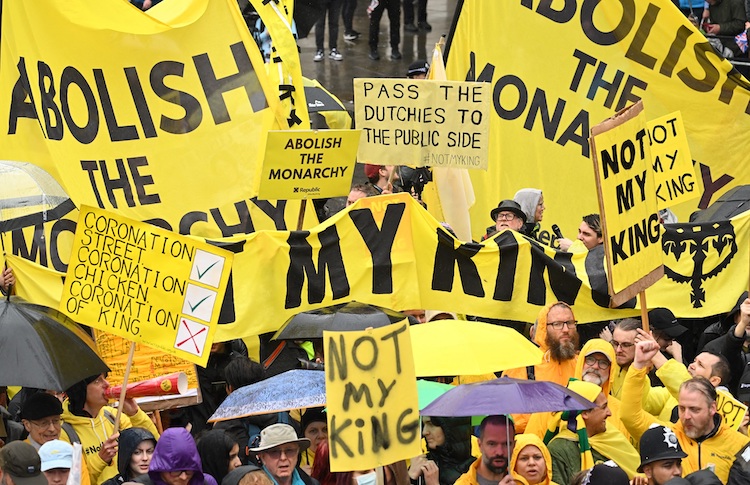By Lisa Vives, Global Information Network
NEW YORK, 8 May 2023 (IDN) — Along streets packed with Londoners, visitors from around the world, and members of the royal class, the coronation of Charles and Camilla was a sumptuous display of pageantry, trumpet fanfare, and gun salutes.
A glittering gold stagecoach built in 1760 was on hand to carry the royals to Buckingham Palace.
But the crowd of three million was not the same as the subjects of empire in days gone by. How much has changed could be seen in waving signs reading “Not My King!”
“Society has changed,” said reporter Liz Stephens. “The Royal Family is not representative of the society we live in.”
“We have a lavish coronation at a time of financial hardship for many,” Stephens said. “I think it’s a disgrace,” added a protestor. “To think this country is in a mess and we’re spending out millions on a coronation.”
At the royal coronation, the public will be asked to pledge their allegiance. But many would much rather bid farewell to the monarchy entirely, given its ties to colonialism and anti-LGBTQ+ laws around the world.
In 1952, as Queen Elizabeth acceded to the throne, British forces declared a state of emergency in Kenya—part of a shrinking British Empire as colonies broke away, seeking independence.
The Kenya Land and Freedom Army, erroneously called “Mau Mau”, was a militant African national movement among the Kikuyu people that was a key element in Kenya’s path to independence.
More than 20,000 Kikuyas were put in British detention camps while 11,000 rebels died in the fighting.
For many, the British monarchy is tied to that harm—the royals ruled over the empire, profited heavily from it, and, it’s argued, were complicit in it.
Many believe King Charles’s coronation is a perfect opportunity to face up to this history and reflect on whether the monarchy should even continue to exist.
Jeremiah Garsha, an assistant professor at University College Dublin, said: “I do think that 2023 is going to be that watershed moment where we look back and see there is no place for a monarchy anymore in a new Britain.”
“For us, as South Africans, obviously this is not something to be excited or happy about,” said Kealeboga Maphunye, professor of African politics at the University of South Africa (UNISA). “It’s actually sadness because right now the country is reeling from much of the colonial legacy of the British era.
“As we speak, I’m told the monarch will be carrying the staff (the royal scepter) which has one of our diamonds from South Africa.”
South African activists have been demanding that the UK return the world’s largest diamond, the Great Star of Africa, which is kept with other jewels in the Tower of London.
“They refer to us today as third world countries,” added Mohammed Ali of Johannesburg, “because most countries on the continent are poor due to the mineral resources, colonialists looted. They are rich because of us and should now return what they looted.”
Victor Izekor, a retired journalist, condemned the British invasion of Benin Kingdom in southern Nigeria, carting away artifacts. “They love their British tradition, but they came to destroy ours,” he said.
The Commonwealth, a group of nations mostly made up of places once claimed by the British Empire, sees the coronation with apathy at best. King Charles should begin repairing the damage of colonialism, said Australian senator Lidia Thorpe, “including returning the stolen wealth that has been taken from our people.” [IDN-InDepthNews]
Photo: Protesters wave ‘Not My King’ signs ahead King Charles III’s coronation. Credit Photo AFP/POOL/Sebastien Bozon
Visit us on Facebook and Twitter.
IDN is the flagship agency of the Non-profit International Press Syndicate.
We believe in the free flow of information. Republish our articles for free, online or in print, under Creative Commons Attribution 4.0 International, except for republished articles with permission.

